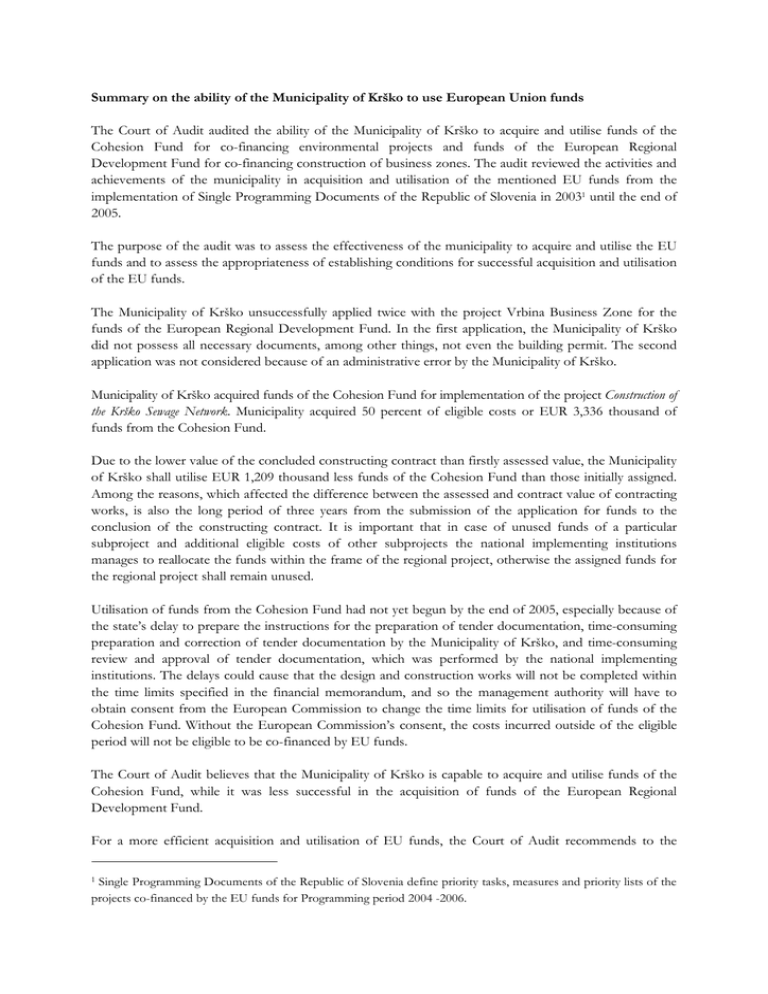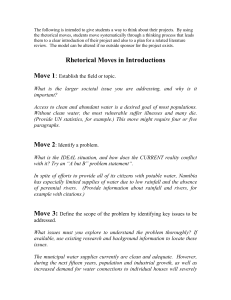Report abstract
advertisement

Summary on the ability of the Municipality of Krško to use European Union funds The Court of Audit audited the ability of the Municipality of Krško to acquire and utilise funds of the Cohesion Fund for co-financing environmental projects and funds of the European Regional Development Fund for co-financing construction of business zones. The audit reviewed the activities and achievements of the municipality in acquisition and utilisation of the mentioned EU funds from the implementation of Single Programming Documents of the Republic of Slovenia in 20031 until the end of 2005. The purpose of the audit was to assess the effectiveness of the municipality to acquire and utilise the EU funds and to assess the appropriateness of establishing conditions for successful acquisition and utilisation of the EU funds. The Municipality of Krško unsuccessfully applied twice with the project Vrbina Business Zone for the funds of the European Regional Development Fund. In the first application, the Municipality of Krško did not possess all necessary documents, among other things, not even the building permit. The second application was not considered because of an administrative error by the Municipality of Krško. Municipality of Krško acquired funds of the Cohesion Fund for implementation of the project Construction of the Krško Sewage Network. Municipality acquired 50 percent of eligible costs or EUR 3,336 thousand of funds from the Cohesion Fund. Due to the lower value of the concluded constructing contract than firstly assessed value, the Municipality of Krško shall utilise EUR 1,209 thousand less funds of the Cohesion Fund than those initially assigned. Among the reasons, which affected the difference between the assessed and contract value of contracting works, is also the long period of three years from the submission of the application for funds to the conclusion of the constructing contract. It is important that in case of unused funds of a particular subproject and additional eligible costs of other subprojects the national implementing institutions manages to reallocate the funds within the frame of the regional project, otherwise the assigned funds for the regional project shall remain unused. Utilisation of funds from the Cohesion Fund had not yet begun by the end of 2005, especially because of the state’s delay to prepare the instructions for the preparation of tender documentation, time-consuming preparation and correction of tender documentation by the Municipality of Krško, and time-consuming review and approval of tender documentation, which was performed by the national implementing institutions. The delays could cause that the design and construction works will not be completed within the time limits specified in the financial memorandum, and so the management authority will have to obtain consent from the European Commission to change the time limits for utilisation of funds of the Cohesion Fund. Without the European Commission’s consent, the costs incurred outside of the eligible period will not be eligible to be co-financed by EU funds. The Court of Audit believes that the Municipality of Krško is capable to acquire and utilise funds of the Cohesion Fund, while it was less successful in the acquisition of funds of the European Regional Development Fund. For a more efficient acquisition and utilisation of EU funds, the Court of Audit recommends to the 1 Single Programming Documents of the Republic of Slovenia define priority tasks, measures and priority lists of the projects co-financed by the EU funds for Programming period 2004 -2006. Municipality of Krško the following: • • • • to forward the documents, which represent the municipality’s long-term strategic programmes, for consideration and approval by the municipal council; to establish an appropriate organizational structure and internal implementation plans already in the initial stage of implementation of particular projects; in the selection procedure for the award of a public contract, not to include those criteria, which only evaluate the tenderer’s qualifications and not the tender itself; to monitor and participate in creation of national development strategies and priority tasks and to monitor possibilities to utilise the European Union funds for co-financing of own activities. Ljubljana, 8 June 2007



